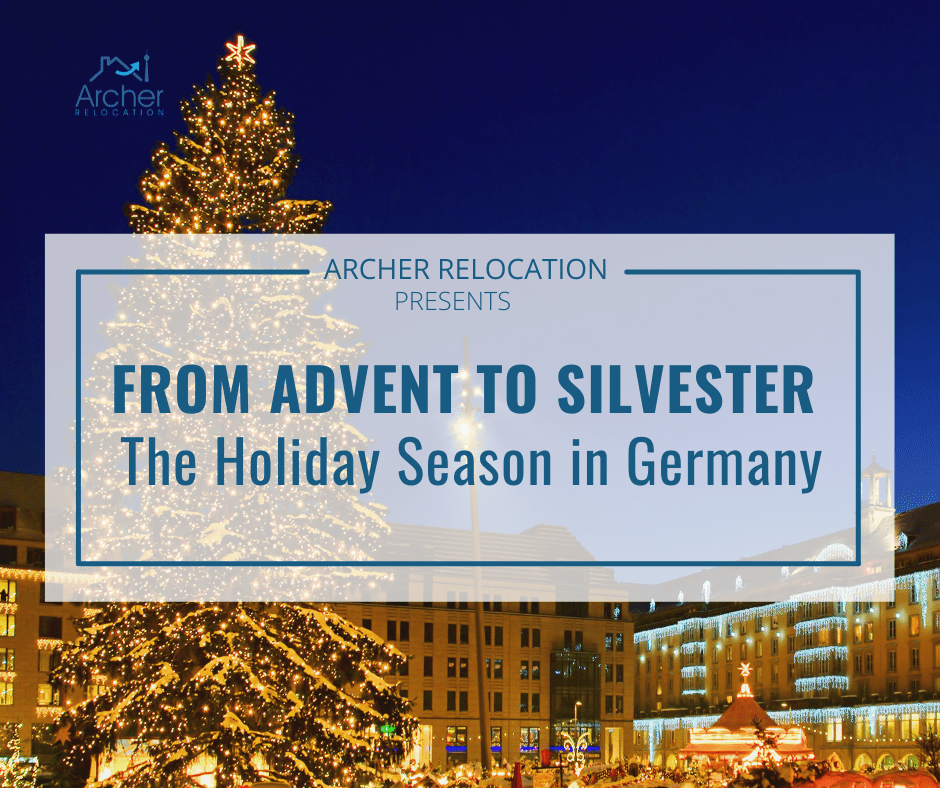From Advent to Silvester: The Holiday Season in Germany

The Holiday Season in Germany
What are the German traditions followed at this time of year? Here are some ways you can join in the celebrations–even if Christmas is not part of your culture.
Advent
Advent, the start of the Christmas season, is a religious Christian celebration. It starts four Sundays before Christmas Day.
The Advent Wreath (Adventskranz)

Traditionally an Advent wreath is made from the branches of evergreen trees such as holly and pine. In the past it was decorated with pinecones and berries. Today, people also decorate it with Weihnachtskugeln (Christmas baubles) and tinsel.
The wreath holds four candles, sometimes with a fifth in the middle. One candle is lit each Sunday during Advent. When the first candle is lit it marks the official start of the Christmas season. The candles represent hope, peace, joy, and love.
If you want to greet someone during advent like a native speaker, you can say, ‘Schönen ersten / zweiten / dritten / vierten Advent.’ meaning ‘(Have a) nice first / second / third / fourth Advent.’
Advent calendars are extremely popular in Germany. Originally designed for children to count down the days to Christmas from December 1, they contain 24 windows, or 24 little bags filled with a treat. One is opened each day.
More recently, Advent calendars are made for kids of all ages and include many themes such as BIO (organic) foods, cosmetics and even alcohol. We’ve heard it said that a small nip of whiskey or specialty gin each day in Advent helps some people cope with the hectic lead up to Christmas.
Traditionally people would go to church on the four Sundays leading up to Christmas. Although things have changed, the custom of wreath making and gifting Advent calendars is still followed, connecting people to their family and close friends.
December 6 – Saint Nicolas Day
Nikolaustag (Nikolaus Day) is a beloved Christmastime tradition in Germany. On the night of December 5, children across the country put their freshly polished boots or shoes outside their door in hopes that St. Nicholas will pass by with a treat or two, or maybe three or four.
Then, on the morning of December 6, lucky boys and girls will wake up to find their shoes filled with oranges, chocolates, and maybe a small toy or two.
If you want to read more about this fun tradition, read our blog: Who and What is Saint Nikolaus?
Frohe Weihnachten (Happy Christmas)
Weihnachtsmarkt (Christmas Markets)
You are probably familiar with the renowned Weihnachtsmarkt which people visit from all around the world. Starting in the last week of November, the Christmas markets are open every day leading up to Christmas.
In Germany, we have left the Covid-Christmas-Market-Lockdown behind us, and the usual Christmas markets are open for all to enjoy. Here you can warm yourself with the traditional German Christmas drink: Glühwein, and snack on Mandeln (roasted and sometimes sugared almonds) and grilled Bratwurst. Then enjoy some rides with the kids or visit the many colourful stalls for Christmas presents and decorations.
You could also choose to shop locally and support the Christmas markets nearest to your Kiez (neighbourhood).
Want to know more about the Berlin Christmas markets?
Our Best Berlin Christmas Markets Tips
Our Best Offbeat Christmas Markets
Heiligabend (Christmas Eve)
Christmas is traditionally celebrated on Christmas Eve with a meal of Kartoffelsalat (potato salad), Sauerkraut (pickled cabbage), Fish (traditionally carp) and Suppe (soup). This is usually accompanied with Glühwein (warmed spiced wine). Afterwards presents are opened under the Tannenbaum (Christmas Tree).
Weihnachten (Christmas Day)
On Christmas Day many households enjoy a roasted bird (turkey, goose, duck) served with dumplings and braised red cabbage. Dessert may include a regional pudding spiced with seasonal flavours (cinnamon, orange, apple) or winter citrus fruits such as oranges or tangerines.
Silvester (New Year’s Eve)
Silvester is what Germans call New Year’s Eve.
You’ll see Berliner Pfannkuchen (jelly filled donuts) with a variety of fillings (chocolate, vanilla, eggnog, fruit) for sale in all the Berliner bakeries and sometimes street stalls. They are a special treat for Silvester. We recommend buying them early in the day as they do sell out!
Raclette (roasted cheese) is also popular for a New Year’s Eve snack or dinner. Buy or borrow a Raclette electric grill and join in the Silvester fun. These snacks are “sehr lecker” (very tasty)!
Feuerwerk (fireworks) displays are popular at iconic structures in big cities, such as the Brandenburger Tor (Brandenburg Gate) in Berlin. It’s common for Germans to buy firecrackers for personal use, so if you are on the streets, especially with children, do watch out for this and take care.
Kirchenglocken (church bells) ring at midnight so listen out for these too!
You can wish your loved ones a happy new year by saying, ‘Ein gutes neues Jahr!
Looking for some winter weekend adventures?
Christmas Markets and other Family Activities in Berlin
How to survive Winter in Berlin
If you are considering a move to Germany, we can help you relocate here. We hope your holiday season is a full of festivity and fun, no matter where in the world you are. Wishing you ‘ein Gutes Neues Jahr’ in 2023!

Archer Relocation has been providing relocation services to families, individuals and companies in Berlin since early 2015. Managing Director, Emily Archer, founded the company desiring to use her first-hand experience as an expat to make the relocation process as smooth as possible for others moving to Berlin. Read other useful information about moving to and living in Berlin, such as ‘How to Find a Berlin Apartment’, on our Berlin Blog.
Sign up for our newsletter to keep up with our Berlin Blog posts and other Berlin expat news here.
Follow us on Facebook and Instagram.



 Previous Post
Previous Post Next Post
Next Post